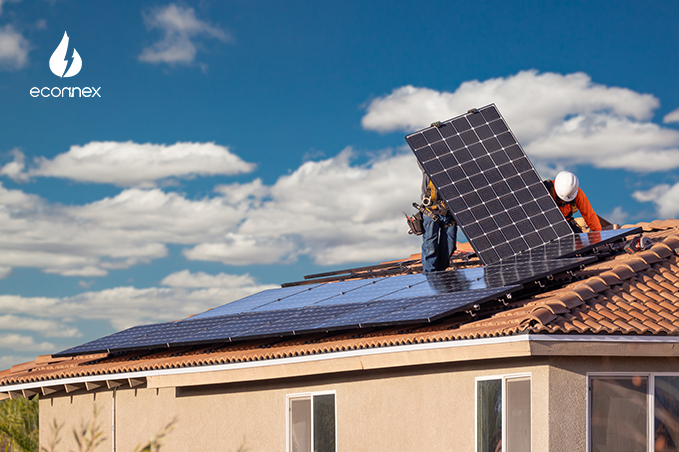
Welcome to our comprehensive guide on solar panels for home use. Solar power has become a popular and sustainable choice for homeowners as the world embraces renewable energy. In this blog, we will delve into the critical aspects of solar panels, including the working of Econnex's solar comparison platform, the cost of installation, determining panel size, the role of feed-in tariffs in various Australian states, potential cost savings, and the viability of incorporating batteries into your solar system. By the end, you'll have a deeper understanding of solar panels and the benefits they can bring to your home.
Econnex's solar comparison platform simplifies finding the right solar panels for home use from our panel of providers. You can easily compare different brands, panel specifications, pricing options, and customer reviews by providing an intuitive interface. With this platform, you have the power to make an informed decision based on your energy requirements, budget, and preferences. Econnex facilitates the seamless purchase of solar panels online, ensuring a smooth transition to renewable energy.
The cost of solar panels can vary depending on several factors, including the size of the system, the brand and quality of the panels, installation requirements, and any additional features such as batteries. On average, solar panel installations can range from $2500 to $20000, with larger and more advanced systems generally commanding higher prices. Considering the long-term savings and return on investment solar panels can provide is essential when evaluating the upfront cost.
Determining the size of the ideal solar panels for home use involves considering your energy consumption, available roof space, and financial goals. A professional solar installer can assess your energy needs and design a system that maximises energy generation while considering local climate conditions and shading factors. You can determine the appropriate panel size that aligns with your specific requirements by analysing your electricity usage patterns.
Feed-in tariffs (FiTs) play a crucial role in incentivising the adoption of solar power. They allow homeowners to earn credits for excess electricity generated by their solar panels and fed back into the grid. The FiT rates vary across different Australian states and are subject to changes based on government policies and regulations. Explore the specific FiT schemes in your state, such as Queensland, New South Wales, Victoria, South Australia, and others, to understand how to benefit from this financial incentive.
Solar panels can indeed save you money over time. By generating your own clean energy, you can reduce reliance on traditional electricity sources and lower your monthly utility bills. The breadth of savings will depend on various factors, including your energy consumption, the size and efficiency of your solar panel system, and the prevailing electricity rates in your area. Investing in solar panels provides the opportunity to secure long-term financial benefits while contributing to a greener future.
While solar panels offer significant long-term savings, considering any potential extra costs is essential. These may include the initial installation expenses, routine maintenance, insurance, and, in some cases, grid connection fees. Additionally, if you choose to incorporate batteries into your solar system, additional costs will be associated with the purchase and installation of the battery storage unit. Evaluating these factors and weighing them against the potential benefits is crucial to make an informed decision.
Batteries can enhance the benefits of your solar panel system by allowing you to store excess energy for use during times when the sun isn't shining. While they provide greater energy independence and the potential to maximise self-consumption, the decision to invest in batteries depends on various factors. These include your energy usage patterns, the availability of net metering or time-of-use tariffs in your area, and the cost of the battery system. Assess your specific needs and consult with solar experts to determine if batteries are worthwhile for your home.
Solar panels offer a compelling solution for homeowners seeking to reduce their carbon footprint, lower energy costs, and embrace sustainable living. By exploring the independent and unbiased information provided by Econnex's solar comparison platform and understanding the cost considerations, size determinations, the role of feed-in tariffs, and the potential benefits of incorporating batteries, you can make an informed decision regarding solar panels for home installation.
Embrace the power of solar energy and join the renewable revolution, contributing to a greener future for generations to come.